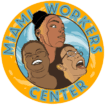When I dare to be powerful, to use my strength in the service of my vision, then it becomes less and less important whether I am afraid. — Audre Lorde
Our History

1999 – The Journey Begins
The Miami Workers Center (MWC) was founded in Liberty City in 1999 by former labor organizers Gihan Perera and Tony Romano and residents from the Liberty City neighborhood in Miami. Building on contacts from labor organizing Gihan and Tony decided to investigate how people from the community were dealing with exploitation not just on the job but in other aspects of their lives.
After initially organizing members around welfare reform, public housing residents demanded the MWC take on the issue of saving public housing from demolition. The MWC began organizing residents of Scott-Carver Homes and Liberty Square, also known as the Pork ‘n Beans, to fight against attempts by Miami-Dade County to demolish the two public housing complexes and replace them with ‘mixed income’ housing.

2000-2005 – First Woman of Color in Leadership
In 2001, Sushma Sheth joined the staff of MWC, as the first Miami native and woman of color in leadership. Sushma, Tony and Gihan coordinated a 1500 mile journey from Miami to Washington DC for Liberty City residents to take their grievances to the US Department of Housing and Urban Development (USHUD). The historic action and confrontation brought needed attention to the HOPE VI demolition of Liberty Square Homes, that years later would be saved and rebuilt. While we were not able to save Scott-Carver homes, our long-term campaign successfully prevented the demolition of Liberty Square and the displacement of residents.
The efforts at Scott-Carver and Liberty Square were powerful campaigns and launched an era of activism in Miami. Notable campaigns during this era included childcare worker organizing, electoral work, and our first foray into Just Disaster Recovery work through mobilizations and support to New Orleans in the aftermath of Hurricane Katrina.

2006 -2012 – Major Affordable Housing Win
In 2006, Sushma and LIFFT leader Rosalie Wiley spent 6 months working closely with the Miami Herald investigative journalism team to support a Pulitzer-Prize winning series “House of Lies” that featured LIFFT members and the true stories of Scott Carver, Liberty Square, and Liberty City residents. The media expose exploded into a county-wide movement to hold Miami-Dade Housing Authority accountable and secure affordable housing for Miami families. MWC and LIFFT leaders led large rallies, sleepovers outside Miami-Dade County Hall, and won the eventual passing of legislation to provide $200 million in affordable housing funds for Miami families.
Following these successful campaigns the Workers Center attempted to expand our scope organizing across different communities and sectors. While there were some significant moments, overall the campaigns did not carry the same weight as the previous housing efforts and the MWC lost its identity. There was a difficult period of transition, including a lack of adequate funding and vision for the organization that demanded a full re-evaluation of the contributions of the MWC to the social justice movement in general and to South Florida in particular.


2012- 2018 – The Femme Agenda
The MWC engaged in a yearlong strategic planning process that revealed some hard truths and, in the process, lit the way forward. Even though most of the organization’s members and leaders were women, we continued to frame our work strictly in terms of race or class. The strategic planning process helped us consider the intersectionality of our members’ experience and recognize the centrality of gender in each of the struggles we took on- housing, child care, community recreation, immigration, etc.
With Marcia Olivo, former Executive Director leading the strategic planning process, members and staff made the decision to build on the legacy of women leaders and intentionally deploy a gender lens to the issues of racial and economic justice. The decision resonated deeply with MWC’s members and core areas of work. Heads of households in public housing are disproportionately women. Childcare providers and customers are primarily women. Domestic workers are overwhelmingly women. The list goes on.
The use of a gender lens was formalized in 2016 with the Femme Agenda, initially a conference for women, girls and femmes to deepen their understanding of the feminization of poverty and to craft a program to end the way poverty disproportionately impacts women. The result was the development of the Femme Agenda framework, which prioritizes strategies for ending the feminization of poverty.
The MWC launched our domestic worker organizing project, refocused our housing campaigns, began fighting for access to healthcare for all and centering the experiences of Black and Brown women. We launched the Femme Power Leadership Institute to provide political education and leadership development for the next generation of Femme Leaders.

